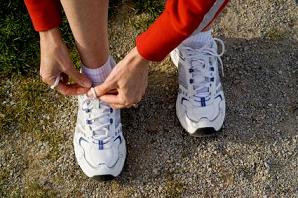Get approval from your doctor – you do not want nasty surprises!
Running shoes. Getting a pair of good running shoes is very important for injury prevention and your comfort. Get expert advice from a proper running shop - not some fashion chain on the high street. In the running shop, a sales person will encourage you to do to the running test to find out your foot type and level of support you need to help to choose the right pair. The proper running shoes come at a price (normally expect to pay $70 - $140), but they will be worth it!
Get the best sports bra you can find if you are a lady.
Clothes. Should be comfortable, how fashionable you want to look it is up to you – you might just go for t-shirt and running shorts or you might want to buy clothes such as CoolMax or Lycra which take sweat away from the body.
Plan your route. Try to keep your route on reasonably flat ground. One steep hill at this stage will be too difficult. Stick to the pavement or sidewalk if you can, roads made of dirt or asphalt are better then concrete which is hard on the body. If you are using a treadmill, a cushy surface gives you more protection from injuries.
Running at night. Always remember about your safety - wear reflective clothing, run towards traffic.
Running cramps. Can be avoided by following a few simple rules:
- Leg cramps running. Running too fast too soon causes muscles cramps. If it happens just gently stretch the muscle.
- Stomach cramps. Running before your meal has digested causes stomach cramps – wait 2-4 hours after a big meal (dairy, meat and fat –takes time to digest).
- Side stitches (a sharp pain below the rib cage) can be prevented by taking evenly spaced deep breaths. If your breathing is not deep the diaphragm does not have enough time to lower for the ligaments to relax. The diaphragm tenses and causes a stitch.
Running stretches help to improve muscles flexibility and feeling less fatigued, also to prevent injuries. Always stretch after your running workouts.
Running Tips Breathing. A correct breathing technique during running is very important for delivering enough oxygen to the muscle which helps to increase your endurance.

No comments:
Post a Comment